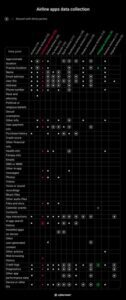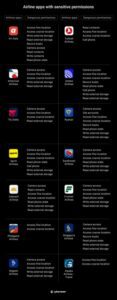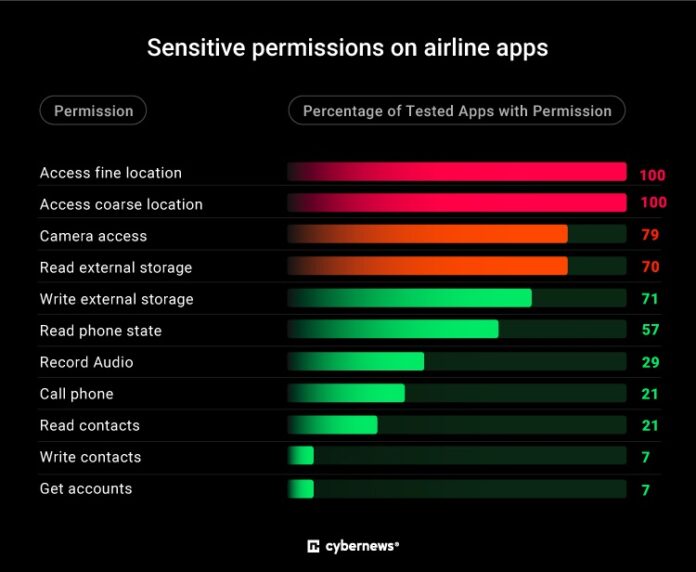 In an era where digital convenience often overshadows privacy concerns, a recent comprehensive investigation by Cybernews into the permissions of popular airline apps has unveiled startling revelations. The study meticulously analyzed 14 renowned airline applications, revealing that these digital gateways to the skies might be harbouring more about us than we ever imagined.
In an era where digital convenience often overshadows privacy concerns, a recent comprehensive investigation by Cybernews into the permissions of popular airline apps has unveiled startling revelations. The study meticulously analyzed 14 renowned airline applications, revealing that these digital gateways to the skies might be harbouring more about us than we ever imagined.
The heart of the investigation focused on the range of permissions these applications require once installed on a traveller’s device. Notably, American Airlines and United Airlines emerged as the most voracious data collectors, while Philippine Airlines appeared to tread more lightly in the digital footprint it gathers.
What stands out is the quantity of data these apps are designed to access and their sensitive nature. The permissions sought after by these digital travel companions allow them to delve deeply into users’ devices, potentially accessing everything from precise location data to intimate details like contact lists and account information. This revelation raises pivotal questions about the necessity and extent of data collection practices within the airline industry.

Every app examined demanded access to the user’s precise location, a feature most airlines justify as necessary for app functionality and enhanced user experience. However, the transparency about this data collection is not uniform. Airlines such as RyanAir, FlyDelta, and Aegean have not disclosed their practice of collecting passenger locations via their apps, a lapse that adds layers of concern regarding user consent and awareness.
The study also uncovered that while twelve apps had permission to use the device’s camera, only a fraction openly admitted to collecting camera-related data. This discrepancy between permissions granted and disclosed usage highlights a broader issue of transparency within digital application operations.
Further scrutiny revealed a concerning trend with storage data and phone state information. Most apps could read and write into device storage, accessing personal files, photos, and documents. Yet, only a few airlines have been upfront about this potential access. Similarly, the ability to read phone state information—permission to expose sensitive device and user identification data—was found in numerous apps without adequate disclosure.

Alarmingly, the investigation also pointed out permissions that seem unnecessarily intrusive to the apps’ intended functionalities. Permissions that allow apps to access users’ contact lists account data on the device, and even the capability to send text messages or make calls on behalf of the user were noted. These permissions, often undisclosed on the Google Playstore, underscore a significant privacy risk, potentially opening doors to unwarranted access and misuse of personal information.
This exposé serves as a crucial wake-up call for airline users and developers. It underscores the urgent need for greater transparency, stricter data privacy practices, and more judicious use of permissions. As digital technology becomes increasingly embedded in every facet of travel, protecting the sanctity of personal data must be paramount.
Travelers are encouraged to scrutinize the permissions requested by airline apps and to weigh the benefits of digital convenience against the potential risks to their privacy. In an age where data is as precious as currency, being informed and vigilant is the first step towards safeguarding one’s digital identity.
As the skies get more digital, our privacy protections must ascend to the challenge. The journey towards a more secure and transparent digital travel experience is a shared responsibility. It’s time for the airline industry to elevate its data privacy standards, ensuring that travellers’ digital skies are as safe as the physical ones they navigate.
Written by: Kanda Limw

